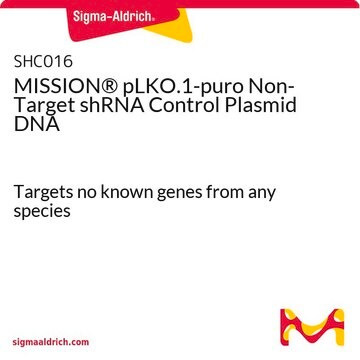SH0111
MISSION® shRNA Human Gene Family Set, Bacterial Glycerol Stock
Kinases
Autenticatiper visualizzare i prezzi riservati alla tua organizzazione & contrattuali
About This Item
Codice UNSPSC:
41106609
NACRES:
NA.51
Prodotti consigliati
Nome Commerciale
MISSION®
Temperatura di conservazione
−70°C
Informazioni sul gene
Cerchi prodotti simili? Visita Guida al confronto tra prodotti
Descrizione generale
The clones are sequenced-verified shRNA lentiviral plasmids (pLKO.1-puro) provided as 50 μl bacterial glycerol stocks (Terrific Broth, carbenicillin at 100 μg/ml and 15% glycerol). The set comes in 96-well plates that are barcoded for simple identification. A CD containing RefSeq, gene description, gene symbol, clone ID, hairpin sequence, locus link, and plate map positions are provided with the gene family set.
Altre note
Each MISSION shRNA clone is constructed within the lentivirus plasmid vector, pLKO.1-Puro, followed by transformation into Escherichia coli. The pLKO.1-Puro vector contains bacterial (ampicillin) and mammalian (puromycin) antibiotic resistance genes for selection of inserts in either bacterial or mammalian cell lines. Each clone set consists of an average of 3-5 constructs that have been designed against each target gene using a proprietary algorithm. Therefore, a range of knockdown efficiency, with at least one construct from each gene set being >70%, can be expected when using these clones. This allows one to examine the effect of loss of gene function over a large series of gene knockdown efficiencies. Each shRNA construct has been cloned and sequence verified to ensure a match to the target gene.
For a detailed listing of other available gene family sets, visit the gene family set website.
Number of Genes:746, Number of Clones: 9418
Avg. Clones per Gene: 12.6
Avg. Clones per Gene: 12.6
The exact gene and clone count at time of purchase may vary slightly as the TRC library is continually updated.
Note legali
Use of this product is subject to one or more license agreements. For details, please see http://sigmaaldrich.com/missionlicense .
MISSION is a registered trademark of Merck KGaA, Darmstadt, Germany
Prodotti correlati
N° Catalogo
Descrizione
Determinazione del prezzo
Codice della classe di stoccaggio
10 - Combustible liquids
Classe di pericolosità dell'acqua (WGK)
WGK 3
Punto d’infiammabilità (°F)
Not applicable
Punto d’infiammabilità (°C)
Not applicable
Certificati d'analisi (COA)
Cerca il Certificati d'analisi (COA) digitando il numero di lotto/batch corrispondente. I numeri di lotto o di batch sono stampati sull'etichetta dei prodotti dopo la parola ‘Lotto’ o ‘Batch’.
Possiedi già questo prodotto?
I documenti relativi ai prodotti acquistati recentemente sono disponibili nell’Archivio dei documenti.
David Murdoch et al.
Current opinion in oncology, 20(1), 104-111 (2007-11-29)
(1) Many of the significant advances in cancer management in recent years have centered on the development and introduction of molecularly targeted therapies, such as monoclonal antibodies and tyrosine kinase inhibitors.(2) Despite targeted therapy that has clearly benefited and even
G Manning et al.
Science (New York, N.Y.), 298(5600), 1912-1934 (2002-12-10)
We have catalogued the protein kinase complement of the human genome (the "kinome") using public and proprietary genomic, complementary DNA, and expressed sequence tag (EST) sequences. This provides a starting point for comprehensive analysis of protein phosphorylation in normal and
Haipeng Liu et al.
Nature, 563(7729), 131-136 (2018-10-26)
Accurate repair of DNA double-stranded breaks by homologous recombination preserves genome integrity and inhibits tumorigenesis. Cyclic GMP-AMP synthase (cGAS) is a cytosolic DNA sensor that activates innate immunity by initiating the STING-IRF3-type I IFN signalling cascade1,2. Recognition of ruptured micronuclei
Virendra S Gomase et al.
Current drug metabolism, 9(3), 255-258 (2008-03-14)
Kinomics is derived from the word kinome that is the kinase part of the proteome. Kinomics is a merger between genomics and proteomics. Defining the kinase complement of the human genome, the kinome, has provided an excellent starting point for
Liwen Wang et al.
Autophagy, 14(3), 518-533 (2017-12-08)
Melanoma is among the most life-threatening cancers. The pathogenesis of melanoma has not been fully elucidated. Recently, dysregulated macroautophagy/autophagy has been found to play a critical but inconsistent role in modulating melanoma growth at different stages, with the regulatory mechanism
Il team dei nostri ricercatori vanta grande esperienza in tutte le aree della ricerca quali Life Science, scienza dei materiali, sintesi chimica, cromatografia, discipline analitiche, ecc..
Contatta l'Assistenza Tecnica.





